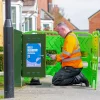Openreach Seek Changes to Upgrade Fibre for UK Flats and Poles

Openreach’s (BT) Director of Corporate Affairs, Catherine Colloms, has told a UK committee for the new Product Security and Telecommunications Infrastructure Bill (PSTI) that the proposed law doesn’t do enough to help them bring gigabit broadband ISP network upgrades to large residential buildings (MDUs) and telegraph poles.
The government has already done a fair bit of work to help make it both quicker and cheaper for gigabit broadband networks – usually via Fibre-to-the-Premises (FTTP) technology – to access big buildings (e.g. apartment blocks), such as via the Telecommunications Infrastructure (Leasehold Property) Act 2021 that tackled situations where so-called “rogue landlords” failed to respond (here and here).
The new PSTI Bill (Summary) also includes some complementary changes to the existing Electronic Communications Code (ECC), which are intended to make it easier for broadband and mobile operators to both upgrade and share related infrastructure.
Advertisement
All of this is intended to help support the UK Government’s new £5bn Project Gigabit programme, which seeks to extend 1Gbps capable networks to reach at least 85% of UK premises by the end of 2025 and then universal coverage by around 2030 (here and here).
The PSTI’s New ECC Measures
➤ A new requirement for telecoms operators to consider the use of Alternative Dispute Resolution (ADR) – a way of resolving disputes that does not involve going to court such as mediation or arbitration – in cases where there are difficulties in agreeing terms. Operators will also be required to explain the availability of ADR as an option in their notices to landowners.
➤ New automatic rights for operators to upgrade and share underground infrastructure – such as fibre optic cables – which were installed prior to the 2017 Code reforms and are not currently covered. This is in cases where there will be no impact on private land or burden on the site provider.
➤ New rules to allow operators to apply for time-limited access to certain types of land more quickly where a landowner does not respond to repeated requests for permission.
➤ New provisions to speed-up negotiations for renewal agreements. Operators who already have infrastructure installed under an expired agreement will have the right to either renew it on similar terms to those for new agreements, or request a new one.
However, Openreach yesterday told a Public Bill Committee for the PSTI that the improved measures don’t go far enough with respect to poles and access to Multi-Dwelling Units (MDUs), because they haven’t been extended to “allow us to upgrade the infrastructure we have in place, either over the pole network or in those blocks of flats.”
Catherine Colloms told MPs that there are approximately 6.1 million blocks of flats in the UK and 1.5 million of those are currently at risk “based on our experience of unresponsive landlords and our inability to get in,” even though some of this is supposed to have already been tackled via the aforementioned Telecommunications Infrastructure (Leasehold Property) Act 2021.
Catherine Colloms said:
“For us, the two big pieces that the Bill can potentially help us with enormously and help supercharge that fibre build is around access, that is access to multi-dwelling units—the approximately 6.1 million blocks of flats in the UK—and access to rural parts of the UK. There are some urban as well, but if you think about how we build, we have a duct infrastructure, but we also have a very extensive pole infrastructure. For most of our rural build—we have committed to building 6.2 million commercial rural, which goes beyond the Project Gigabit programme that the Government are talking about to the hardest-to-reach areas—we are going to have to do most of that over our existing pole network. At the moment, the Bill makes some changes that are helpful and which progress us forward by allowing us access to upgrade our current infrastructure on underground ducts. What it does not do is allow us to upgrade the infrastructure we have in place, either over the pole network or in those blocks of flats.
If you think about what we have in place today, we have our existing network, so we have the ubiquitous either copper or hybrid copper network that is there today in pretty much all of these premises, all across our poles. We are trying to upgrade that network to full fibre as rapidly as possible and to do so, it would be incredibly helpful if we were able to upgrade our existing infrastructure. The Bill at the moment allows us, as I said, to do that through underground ducts. It is not going to allow us to get into either MDUs to upgrade more rapidly – we estimate that something like 1.5 million MDUs could be at risk based on our experience of unresponsive landlords and our inability to get in – and it also does not allow us to automatically upgrade our property and the infrastructure that we have over the pole network.
To give you a bit of context, we have 1 billion metres of cable over poling at the moment. The vast majority of the rural network is served over poles, so for us it is really important to be able to deliver those 6.2 million commercial rural, but also potentially the Project Gigabit programme. We have been working in Scotland on the R100 programme – the “Reaching 100%” Scottish Government programme. We need one wayleave for every 16 premises, to give you the sense of scale. We are finding the ramp very challenging and because of the scale and pace that we are trying to build at, what we really need is ease of access, ease of upgrade and that is the opportunity we think with the Bill.”
On the subject of poles, we haven’t actually seen too many problems with this, as much of the build occurs on public land and property. Most operators certainly seem to have few issues with deploying them, which often occurs under Permitted Development (PD) rights. But some areas can still run into the usual issues with wayleaves (i.e. securing legal land / property access agreements), such as in Scotland where CityFibre noted that “there are a lot of poles sitting in people’s backyards” (private property).
Advertisement
Back to MDUs. Catherine went on to highlight the example of their experiences in Salisbury, which not so long ago became one of their first 100% full fibre cities in the UK. But even after lots of effort, Openreach found they could still only get into about 79% of MDUs, because of non-responsive and non-communicative landlords: “If we were to scale the MDU team that we had for dealing with the amount of time it would have taken to tackle those unresponsive landlords, we would effectively be scaling from a team of about 17 to over 300.”
However, the Government will need to balance all this against wider concerns – as echoed by Julia Lopez MP – that some telecoms operators have been using their financial might to “bully landowners” (arguably more of an issue with certain mobile operators), while also offering “low rents” for the infrastructure they place.
In some cases the rents may not even be enough to mitigate concerns about future property damage, insurance costs and safety, but experiences do vary. Likewise, such issues can get more personal when you start talking about the backyards of individual homeowners (i.e. politicians won’t wish to anger voters by allowing gardens to be damaged at leisure).
“Just to give some kind of context for fixed, we do not tend to have these kinds of disputes, to the extent that you are not going to make a ton of money, frankly, by having a few poles on your land. A pole rental is between £10 and £20 a year … If you think about ducting and cabling going through, that is anything from 19p to 49p a metre, so it is not a revenue generator per se. For us, the conversation with landowners is predominantly about access,” added Catherine.
Advertisement
The Group Chief Operating Officer (COO) of CityFibre, Simon Holden, was also in attendance and welcomed the Bill’s dispute resolution mechanism, albeit while stating that they were “concerned a little with somehow grandfathering old wayleaves inside buildings, first because it does not seem balanced, but also because it will entrench the people who have those, which I would say is mostly Openreach.” By “grandfathering” they mean the act of exempting long-time customers or users from new requirements.
Simon noted that the new ADR process would be helpful when dealing with larger landowners (e.g. housing associations or local authorities), but Openreach pointed out that it may not be as helpful when it comes to the hundreds of thousands of wayleaves that big operators need in order to get into all the individual MDUs.
The Bill is currently working its way through the House of Commons, before being passed over to the Lords for further amendments. Assuming all goes well, we could see it being passed into law by the end of this year, but that very much depends upon the usual political timescales and consultations.
Mark is a professional technology writer, IT consultant and computer engineer from Dorset (England), he also founded ISPreview in 1999 and enjoys analysing the latest telecoms and broadband developments. Find me on X (Twitter), Mastodon, Facebook, BlueSky, Threads.net and Linkedin.
« Wales to Close Top Up Scheme for Gigabit Broadband Vouchers
Mobile Broadband Speeds on Different iPhone Models Compared »






















































Some of the issue with OpenReach not getting access is due to them not wanting to pay wayleave’s to freeholder. Recently had this and the residents had to pay.
In my experience very few providers are prepared to pay for wayleave agreements to get access to serve an MDU. It’s to the benefit of the freeholder to have their building upgraded, yet I’ve seen multiple occasions where the building owner expects thousands of pounds in payments to gain access.
Wayleaves to cross land to serve other customers is a different matter entirely and reasonable payments make sense in these situations.
At least for the cases where the problem is upgrade, I’d do it like in Italy. Is there existing infrastructure in place that provides public telephone service? Then the infrastructure provider has the right to access property – no question asked. It’s called “servitù coattiva” and puts the public interest in front of the landlord’s. It makes no sense to have these blockages because in this country there’s plenty of people that owns land and doesn’t give a monkey about its management (like I saw across too many London properties, those boomers should get that land confiscated in a fair world).
A fair right of access is one thing chap, but…
“like I saw across too many London properties, those boomers should get that land confiscated in a fair world”
Smacks of simple jealousy. There’s no need for that pal.
Openreach installed Fibre to underground chambers in Dec.2020.They are still waiting for wayleave to install into the MDU where I live.
Usual wayleave problem with landlords agent SIMARC, who are notorious for this type of behaviour, usually demanding a huge fee.